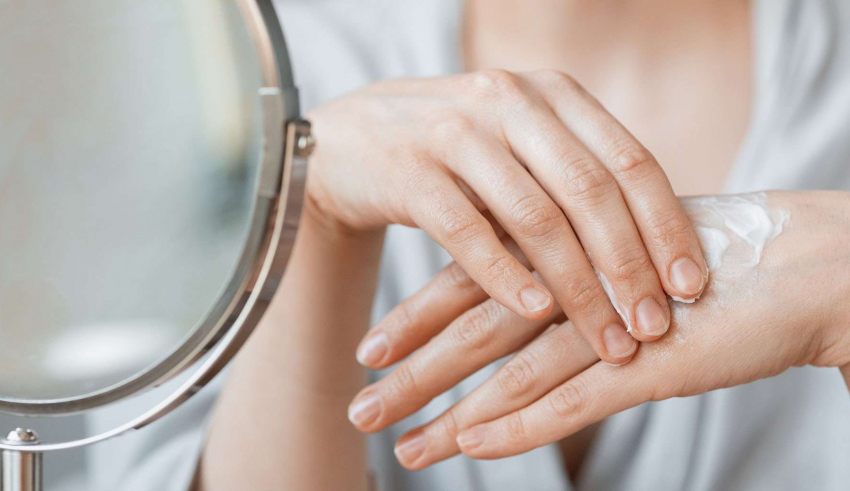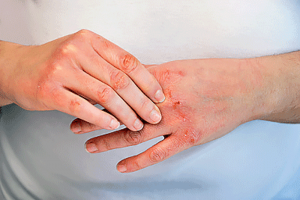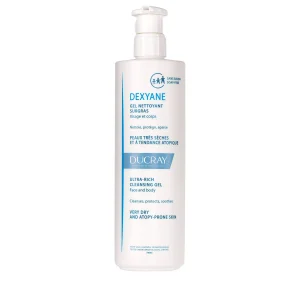
You’ve probably heard of the itch that occurs when you dip your hands in a kitchen sink full of soapy water. However, when people talk about it, they are usually referring to hand eczema, also known as hand dermatitis. Eczema on hands is an inflammatory condition that causes blisters and itching on the palms or fingers. It can be painful and people may feel embarrassed by the condition because it is visible to others. To learn more about this condition, read this article from The Dermo Lab in collaboration with the dermatologist and cosmetologist Dr. Ghada Ahmed.
What is hand eczema?
According to Dr. Ghada Ahmed, hand eczema is a common acute or chronic dermatitis that affects the palmar or dorsal surface of the hands due to a variety of factors.
Many of you ask if eczema is contagious, so Dr. Ghada Ahmed explains that hand eczema is usually the result of a combination of the following factors:
- Genetic factors (filaggrin deficiency).
- Injury (contact with irritants).
- Immune reactions (allergic contact dermatitis).
Hand eczema is therefore not contagious.
She adds that irritants include water, acids, alkalis, solvents, detergents, etc. These irritants affect the barrier function of the skin, resulting in water loss and inflammation.
The symptoms of hand eczema can impact a person’s self-esteem, as it can affect their ability to carry out daily activities.
Keep reading to learn more about the causes, symptoms, and treatment of hand eczema.
What causes eczema on hands?
Eczema is an inflammatory skin condition that develops in people whose immune systems are over-reactive. When a person comes into contact with something that can irritate the skin, the immune system generates an inflammatory response that causes itching and redness.
While no one knows what causes eczema, some researchers believe that a combination of genes and environmental factors may result in inflammation leading to an allergic reaction.
Here are some of the causes:
1- Chemicals and irritants
People who work with detergents or soap and cement are more susceptible to developing eczema on their hands. This is common among people who work in hairdressing, food service, construction, and engineering.
2- Water
Anything can irritate the skin and cause eczema flare-ups. People who frequently wash and dry their hands are more likely to suffer from hand eczema.
Even when a person dries their hands, some water remains on the skin. This water evaporates and reduces the natural oils in the skin.
Using hot water when washing hands can also deplete natural oils, which can also trigger an eczema flare-up.
3- Stress
When a person is stressed, the body releases two hormones called cortisol and epinephrine. These two suppress the immune system and trigger inflammation of the skin.
4- Sweat
Sweat contains minerals that can irritate the skin. When sweat does not dry completely, it can cause itching leading to eczema flare-ups.
5- Food allergies
Certain foods can cause allergies, resulting in eczema flare-ups on the hands. These include dairy products such as milk, eggs, nuts, wheat, and soy products.
6- Cold temperatures and dehydration
Dry air and sudden temperature changes in winter can dehydrate the skin and trigger eczema flare-ups.
What are the symptoms of hand eczema?
Dr. Ghada Ahmed notes that acute hand eczema can present as scaly, itchy, erythematous macules and plaques, sometimes with oozing, blistering lesions, and fissures if severe. Secondary bacterial infection is common.
She adds that when it becomes chronic, it leads to xerosis. Note that the term chronic is given if the condition is longer than 3 months, or recurrent 2 to 3 times in a 12-month period.
Other symptoms include
- bleeding
- cracking
- dryness
- itching
- inflammation
- red or dark spots
How to heal eczema on hands?
Here are some basic steps you can take to help control eczema on hands:
1- Find the cause
According to Dr. Ghada Ahmed, the best treatment for hand eczema is to avoid contact with irritants.
By being aware of what triggers your hand eczema, you can protect your skin from further irritation.
If you suspect that a substance at home or work is causing your hand eczema, your doctor can perform a “patch test” to determine which allergens or irritants are responsible for your eczema.
The most crucial thing to remember is consistency – a daily skin care routine is the best defense.
2- Cut back on handwashing
Only wash your hands when they are dirty or full of germs, such as after using the bathroom. Every time you wash, you rinse away some of the nourishing oils your skin makes.
Also be careful when choosing a soap, as some contain harsh chemicals. Look for products that are gentle on sensitive skin. That’s why Dr. Ghada Ahmed recommends using soap-free cleansers.
Adding to this, avoid waterless antibacterial cleansers, as they often contain ingredients such as alcohol and solvents that are very harsh on hands (especially during flare-ups).
Here are 3 cleansers that will moisturize your skin without irritating it.
Eau Thermale Avene XeraCalm A.D Lipid-Replenishing Cleansing Oil
A-Derma Exomega Control Emollient Shower Oil
Ducray Dexyane Ultra-Rich Cleansing Gel
3- Keep your skin dry
Gently blot your hands dry and apply a moisturizer immediately after washing your hands.
The most effective moisturizers are those with a high oil content (such as ointments and creams). Leave one by every sink at home, so you remember to apply it after washing your hands.
Moisturizing your skin regularly will help keep it hydrated and relieve dryness. A hand eczema cream acts as a barrier and prevents irritants from coming into contact with the skin. It can also be used to prevent the development of a secondary bacterial infection.
Here are the products we recommend you try which will help protect the skin’s moisture barrier when weakened by eczema.
4- Wear gloves
Use cotton-lined protective gloves when cleaning or using chemicals. Latex gloves can trigger allergic reactions, so it’s best to avoid them. Don’t wear waterproof gloves for too long, though, as they can make your hands sweat and cause an itchy flare-up.
Use disposable gloves when handling foods such as citrus fruits, tomatoes, onions, chilies, garlic, peppers, or meat.
5- Reduce the shower power
A long, hot shower may seem like heaven, but it’s anything but heaven for your skin. Instead, take short, warm showers every day or two to prevent dry skin. After the shower, pat your skin dry instead of rubbing it.
6- Manage cracks on your hands
If an outbreak causes lesions and bleeding on your hands, we recommend applying the following cream which treats eczema lesions. Its formula is rich in anti-irritant, soothing, and repairing active ingredients for the treatment of eczema lesions.
Ducray Dexyane MeD Soothing Repair Cream
Dr. Ghada Ahmed adds that in severe acute flares, a short course of systemic steroids for 2 to 4 weeks is added. In refractory cases, phototherapy is required, and sometimes drugs such as methotrexate or azathioprine are recommended to control the disease.













